We are proud to say that these posts are not sponsored. Our editorial team of Bobbie moms and writers personally select each featured product. If you buy something through our links, we may earn an affiliate commission, at no cost to you.
Congratulations, you made it to your baby’s first birthday! While this is cause for pause and celebration, many parents find themselves wondering what comes next as they wean their baby from infant formula or breastmilk. Questions arise like, what is the best toddler milk? What is toddler formula? Should I use something plant-based?
If you have these questions, you’re not alone! Let’s dive into the wide world of toddler drinks.
Milk Drunk’s Top Picks for Best Toddler Formula
- Baby’s Only Organic Dairy with Whey Toddler Drink
- Baby’s Only Organic Plant-Based Pea Protein Toddler Drink
- Baby’s Only Organic Sensitive Toddler Drink
- Else Nutrition Toddler Formula
- Holle Cow Milk Toddler Drink
- Kabrita Goat Milk Toddler Formula
- Nestle Nido Toddler Milk Beverage
- Serenity Kids A2 Whole Milk Toddler Formula
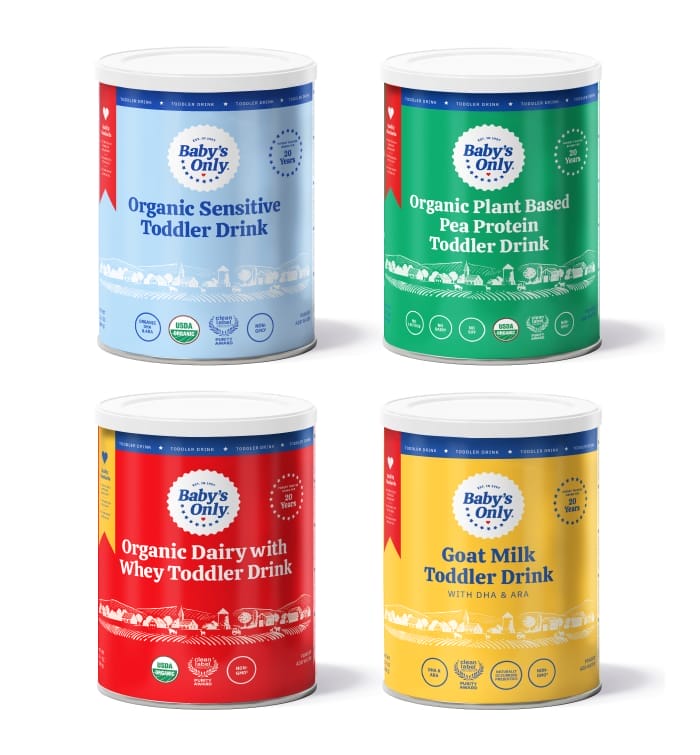
Shop Baby's Only Toddler Drink
The most affordable organic formula in the U.S. with cult favorite toddler drinks such as plant-based pea protein drink and a goat milk toddler drink.
What is Toddler Formula?
Toddler formula, also called toddler milk, “growing up milk,” or “follow-on milk” is a powdered drink product that is intended to supplement a little one’s diet between the ages of 1 and 3. While the American Academy of Pediatrics, or AAP, recommends switching to whole cow’s milk after 12 months, some parents like the peace of mind that comes with using a fortified product filled with extra vitamins and minerals. We know many toddlers are picky eaters, and relying on food as the sole source of nutrition gives some parents pause. Toddler formulas typically provide the calories and fat found in whole milk with the addition of certain nutrients and fatty acids that young children often need, including DHA and ARA for brain development.
Why Do I Stop Using Infant Formula at 12 Months?
Many parents wonder why they can’t use an infant formula beyond 12 months, particularly because nursing parents often breastfeed beyond the 1st year. The short answer? The nutritional needs of children change from infancy to toddlerhood, and while breast milk composition evolves over time to meet these changing needs, infant formula does not!
Baby formula is produced to be the sole source of nutrition for non-breastfed infants and is nutritionally complete, containing everything an infant needs to grow and thrive. Before 12 months, formula or breastmilk should be the primary source of nutrition and calories, with solid food as a complement. After 12 months, this switches! For a toddler, the primary source of nutrition and calories should be food, with milk or toddler formula complementing a whole-foods diet. Toddlers simply don’t need the comprehensive nutrient panel found in infant formula!
Additionally, toddler drinks (whether cow’s milk, plant-based milk alternatives, or toddler formulas) tend to be significantly cheaper than infant formula, and many parents are eager to bulk up their wallet after paying for baby formula month over month. While you can keep giving infant formula after 12 months, it makes more sense (from a nutrition and budget standpoint) to switch to something else.
How to Choose a Toddler Formula
When choosing the best toddler formula, parents should consider their values and priorities as well as their child’s needs. With the breadth of options available in the market, it’s possible to find an option that everyone can feel good about. Parents should weigh the following questions:
- Budget
How much are you willing or able to spend on toddler formula?
- Dietary restrictions
Are you a plant-based family?
Do you avoid certain ingredients due to religious beliefs?
Does your child have allergies or another medical condition impacting their diet?
- Availability
Do you prefer to pick items up in store?
Do you want a set-it-and-forget-it subscription formula that comes direct to your door?
- Quality indicators
Is it important to you to use a brand you already know and trust?
Do you want an organic toddler formula?
Do you want a product that has received the Clean Label Project Purity award?
- Ingredient preferences
Do you want a cow milk-based toddler formula?
Do you want to avoid corn syrup or other added sugars?
Would you prefer to avoid soy milk-based products?
Are DHA and ARA fatty acids important to you?
Once you’ve narrowed down what you’re looking for in a toddler milk, use the list below of best toddler formulas to select an option that meets your needs!

Shop Baby's Only Toddler Drink
The most affordable organic formula in the U.S. with cult favorite toddler drinks such as plant-based pea protein drink and a goat milk toddler drink.
Best Toddler Formulas
We’ve compiled a list of our favorite toddler formulas, all of which are available online and in-store, and which cover a wide variety of preferences and needs.
Baby’s Only Organic Dairy with Whey Toddler Drink
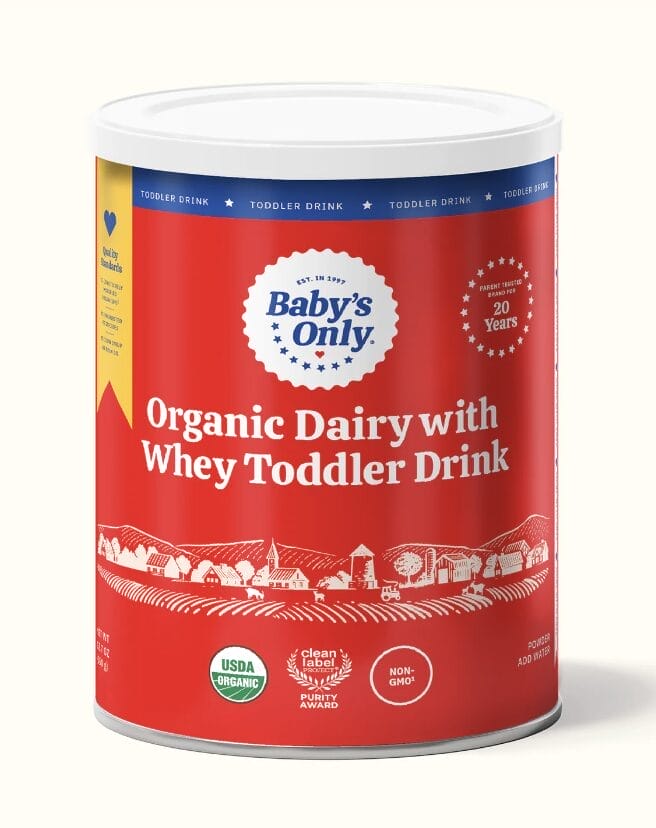
Pros:
- USDA Organic
- Clean Label Project Purity Award winner
- Features exclusively lactose as the carbohydrate source– no corn syrup!
- Contains added whey for easier digestion
- Subscription discount available!
- Cost-effective
Cons:
- Does not contain DHA or ARA fatty acids
- Does not contain prebiotics or probiotics
- Only available in small 360g cans
Baby’s Only Organic Plant Based Pea Protein Toddler Drink
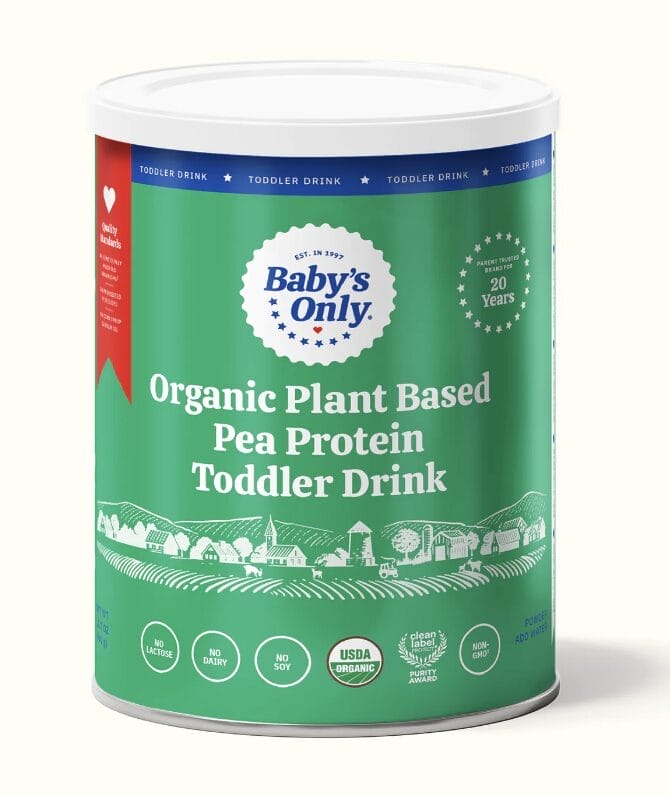
Pros:
- USDA Organic
- Clean Label Project Purity Award winner
- Features exclusively lactose as the carbohydrate source– no corn syrup!
- Contains added whey for easier digestion
- Subscription discount available!
- Cost-effective
Cons:
- Does not contain DHA or ARA fatty acids
- Does not contain prebiotics or probiotics
- Only available in small 360g cans
Baby’s Only Organic Sensitive Toddler Drink
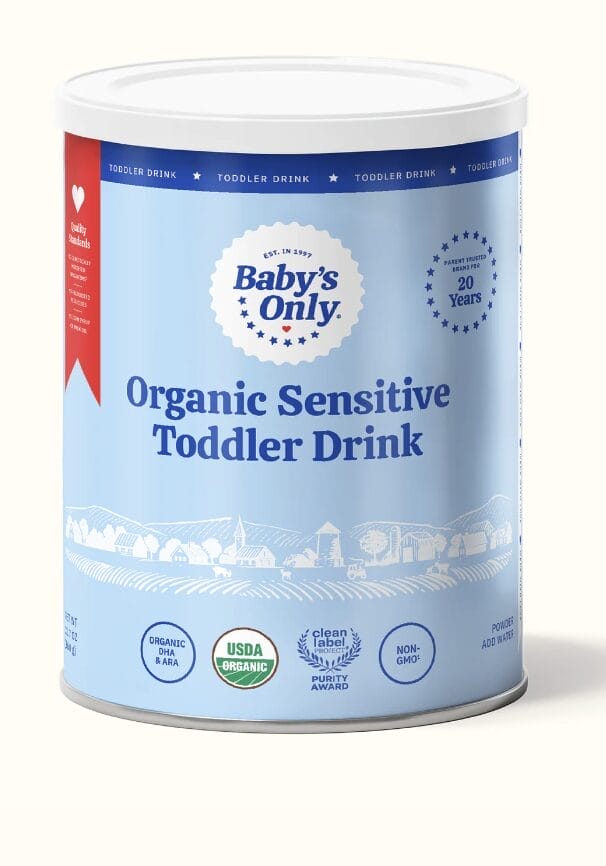
Pros:
- USDA Organic
- Clean Label Project Purity Award winner
- Features exclusively lactose as the carbohydrate source– no corn syrup!
- Contains added whey for easier digestion
- Subscription discount available!
- Cost-effective
Cons:
- Does not contain DHA or ARA fatty acids
- Does not contain prebiotics or probiotics
- Only available in small 360g cans
Else Nutrition Toddler Formula
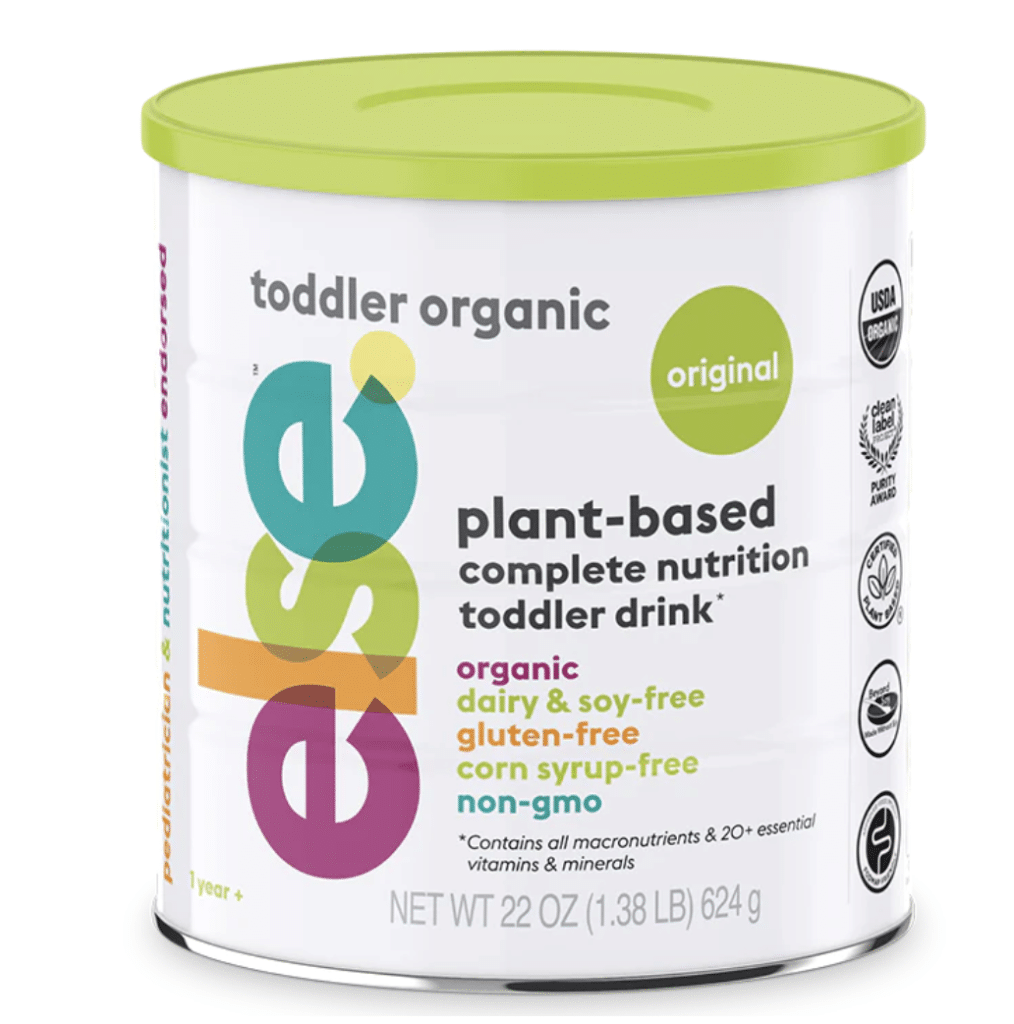
Pros:
- USDA Organic
- Dairy-free and lactose-free for those with milk intolerance
- Soy-free
- Corn syrup-free
Cons:
- Contains almonds, a Top 8 allergen
- Does not contain DHA or ARA fatty acids
- Contains cane sugar
Holle Cow Milk Toddler Drink
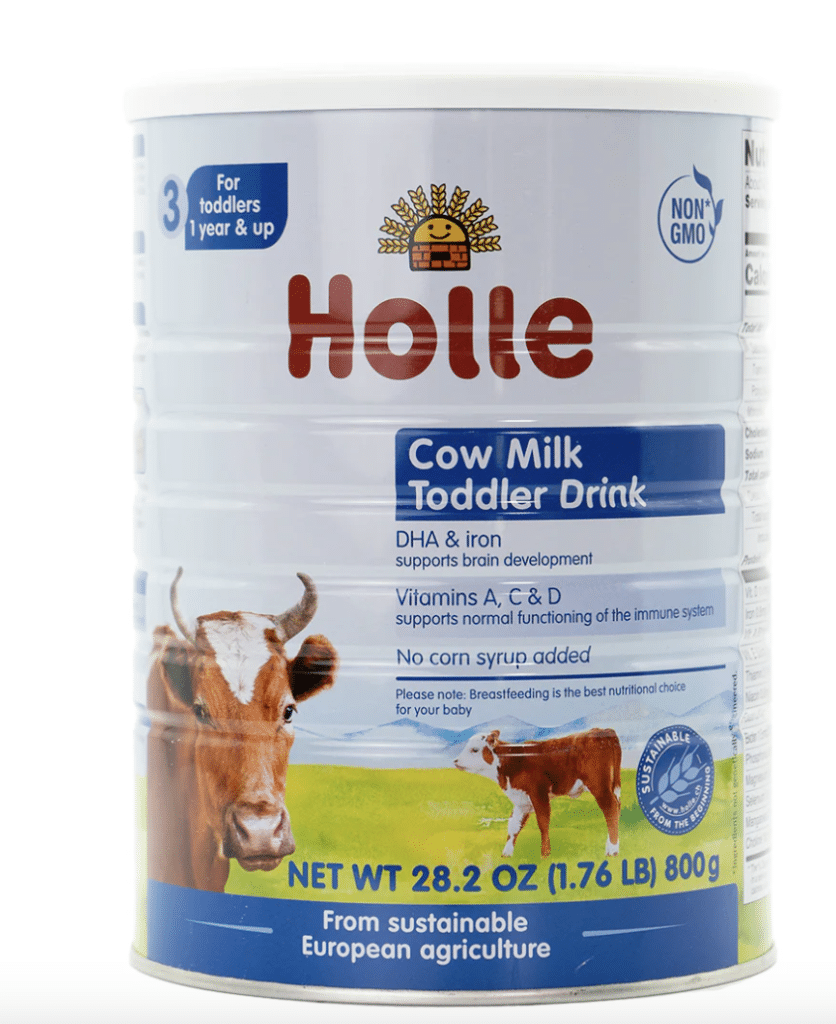
Pros:
- Non-GMO ingredients
- Added whey protein for easy digestion
- Contains DHA and ARA fatty acids
- Corn syrup-free
Cons:
- Not organic
- Contains corn maltodextrin as a carbohydrate
- Contains palm oil, which may result in firmer stools
- Not widely available in retail stores
Kabrita Goat Milk Toddler Formula
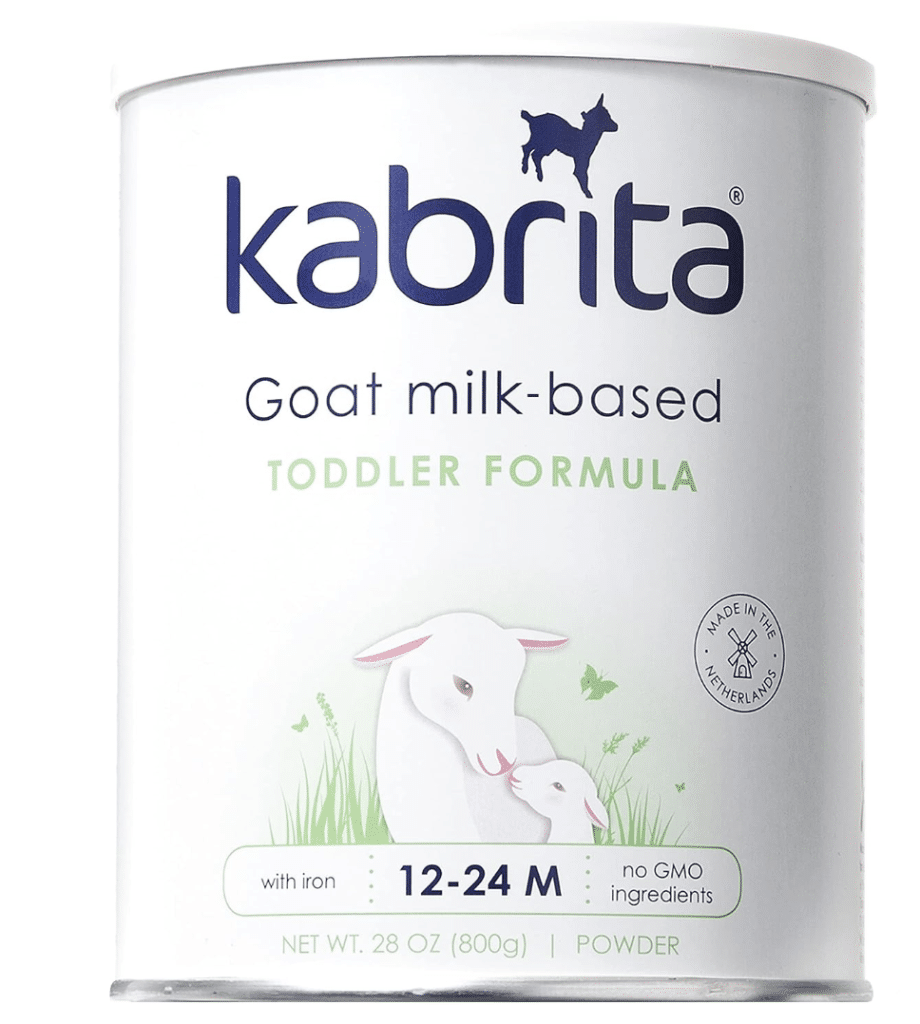
Pros:
- Non-GMO ingredients
- Added whey protein for easy digestion
- Includes GOS prebiotics
- Naturally occurring a2 beta-casein goat milk proteins may be suitable for those sensitive to cow milk proteins
Cons:
- Not organic
- Higher cost per fluid ounce
- Not available in mainstream grocery stores
Nestle Nido Toddler Milk Beverage
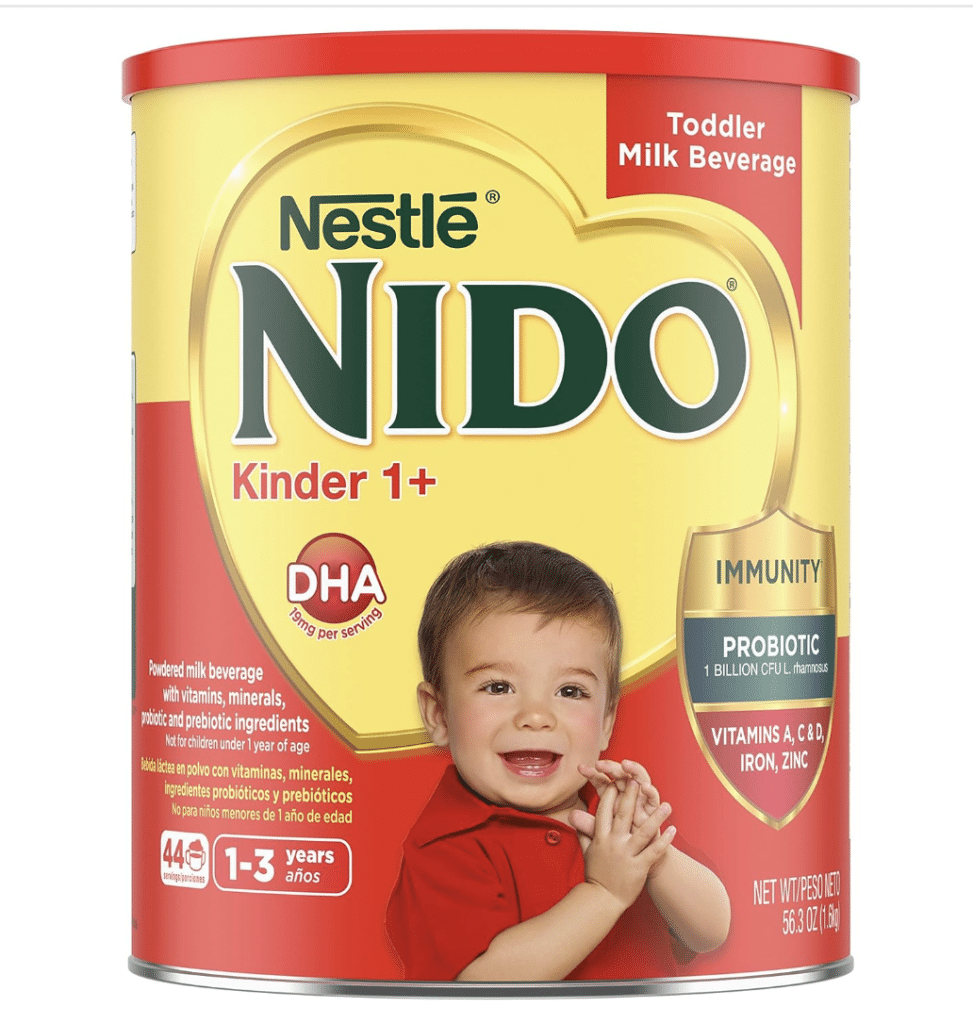
Pros:
- Milk-based
- Includes prebiotics and probiotics
- Includes DHA fatty acid
- Cost-effective
Cons:
- Not organic
- Contains sugar, maltodextrin, and honey as carb sources
- DHA is sourced from tuna fish oil (allergen)
- Contains palm oil which may result in firmer stools
Serenity Kids A2 Whole Milk Toddler Formula
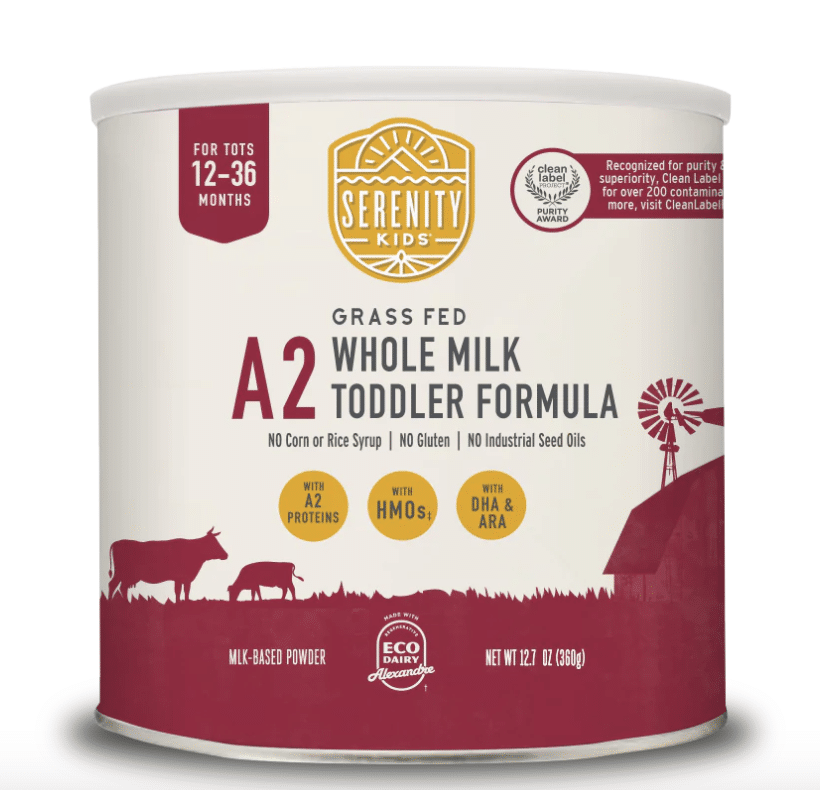
Pros:
- Organic ingredients
- Added whey protein for easy digestion
- Includes HMO prebiotics
- Naturally occurring a2 beta-casein proteins may be suitable for those sensitive to conventional cow milk products
Cons:
- Not USDA certified organic
- Higher cost per fluid ounce
- Not available in mainstream grocery stores
- Contains palm oil which may result in firmer stools
Choosing the Best Toddler Formula
With so many options on the market, not to mention whole cow’s milk and plant-based milk alternatives, it’s no wonder parents can get overwhelmed. By understanding the role of toddler formula (and its benefits) and how top products compare, you can be empowered to make a purchasing decision that meets your baby’s and family’s needs.


